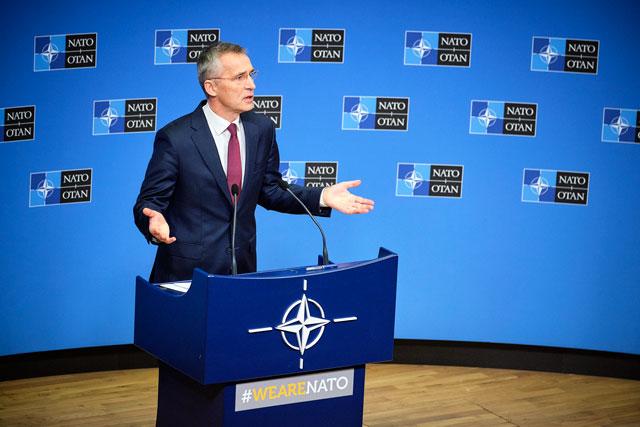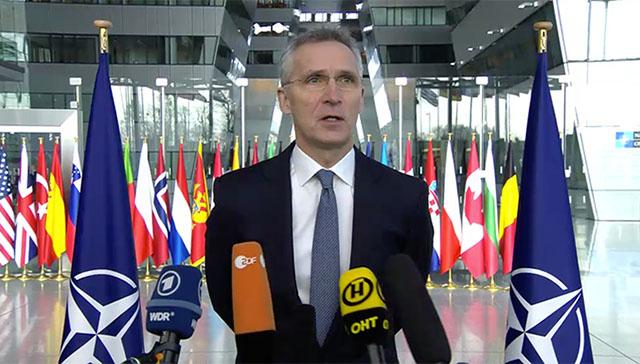You are here
NATO committed to working with Jordan in various fields — Stoltenberg
By Mohammad Ghazal - Feb 11,2020 - Last updated at Feb 11,2020

NATO Secretary General Jens Stoltenberg speaks to reporters on Tuesday ahead of the two-day meetings of NATO defence ministers in Brussels on Wednesday (JT Photo)
BRUSSELS — Jordan is important for the whole region, NATO Secretary General Jens Stoltenberg said on Tuesday as the head of the transatlantic alliance stressed on commitment to continue working with the Kingdom in various fields.
“NATO is working with Jordan on issues such as special operation forces, intelligence and other things… Jordan is important for the whole region because it has been a key member of the coalition to defeat Daesh and a close partner of NATO,” Stoltenberg said in response to a question by The Jordan Times at a conference ahead of the two-day meetings of NATO Defence ministers that will start in Brussels on Wednesday.
Defence ministers of NATO, which is working with partners in the region including Jordan to combat terrorism, will look into what more NATO could do to build security and stability in the Middle East.
They will also discuss what more involvement in the Middle East could mean to the alliance following a call in January by US President Donald Trump “to become more involved in the Middle East".
“We will discuss what we can do in Iraq and what we can do beyond Iraq. We already have an alliance and we are working with Jordan,” said Stoltenberg, referring to a visit in January by His Majesty King Abdullah to NATO headquarters, where it was agreed to renew the Jordan-NATO cooperation agreement, in addition to the capacity building programme package, and the advanced status partnership programme.
‘Jordan doing incredible job’
US Ambassador to NATO Kay Bailey Hutchison commended the alliance with Jordan, saying: “Jordan is a very important enhanced opportunity partner and a close ally for the United States as well.”
“Jordan has really done an incredible job already with our help in dealing with refugees and other issues and we do share information with Jordan,” the ambassador said during a press conference in Brussels.
Asked on Jordan’s expected role as the US is urging NATO to boost its Middle East involvement, she said, “Jordan will continue to play an important role as a state that has done everything it can for the benefit of its people and wanting to build its economy and their security and they have done everything they can to put in place all of the basis needed for their own protection and we are helping them with NATO and we value Jordan as great partner of the US and NATO.”
At the 2014 NATO Wales Summit, Jordan was among five countries identified by the alliance as eligible for enhanced opportunity partnerships for dialogue and cooperation, alongside Australia, Finland, Georgia and Sweden. The alliance said these partners are making “particularly significant contributions” to NATO operations.
Keen on presence in Iraq
At the presser, NATO officials said the defence ministers will discuss options for operations in the Middle East.
“We are discussing what more NATO can do,” he said, adding that the alliance is keen on resuming its training of Iraqi forces, which was suspended in January due to security concerns.
“We have NATO personnel in Iraq [and] we will resume training as soon as possible…We are in close consultation with the Iraqi government because we will only stay in Iraq based on the invitation from Baghdad,” he added.
Hutchison said that the alliance was seeking military advice, both from NATO and Iraq, on how to increase the mission.
In 2018, NATO agreed to start a training mission in Iraq involving around 500 troops to help build and support Iraq’s armed forces to combat extremist groups
On more involvement in the Middle East, Stoltenberg said: “We have a potential to do more in fighting terrorism... We can do more and we will discuss that and Trump expressed clear wish for more support from NATO. We have good dialogue and working with countries concerned on how we can do more. But we will announce decisions when we make them.”
“Violence and instability in our southern neighbourhood have caused suffering in the region, driving the refugee and migrant crisis and has also fuelled the threat of terrorism.
“That is why NATO allies have been engaged for many years in the region, and built close partnerships,” he said.
Ministers will also discuss how NATO can coordinate with the Global Coalition more closely and will consider what more NATO can do in the wider region to build long-term stability and security.
Related Articles
BRUSSELS— NATO defence ministers are expected to recommit to the alliance’s training mission in Iraq and step up support to the Iraqi govern
BRUSSELS — NATO will assess its training and capacity building support for partners like Iraq and Jordan at the alliance’s foreign ministers
AMMAN — NATO Secretary General Jens Stoltenberg on Monday stated that His Majesty King Abdullah's evaluation and analysis are important and

















